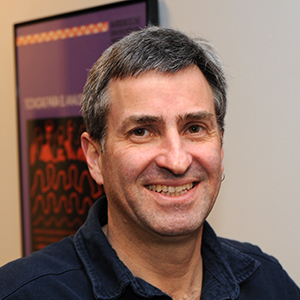One of the central problems in biology is understanding how genomic variation affects genome function to influence phenotypes. NHGRI initiated a new program, the Impact of Genomic Variation on Function (IGVF) Consortium, to develop a framework for systematically understanding the effects of genomic variation on genome function and how these effects shape phenotypes. The program is based on recommendations from the 2019 workshop "From Genome to Phenotype: Genomic Variation Identification, Association, and Function in Human Health and Disease" (workshop report). IGVF is a research consortium that brings investigators together in a highly collaborative effort to examine how genomes function, how genome function shapes phenotypes, and how these processes are influenced by genomic variation. The program utilizes emerging experimental and computational genomic approaches to build a catalog of the impact of genomic variants on genome function and phenotypes.
Visit the IGVF Consortium website.
Participants and Projects
| Awardee | Institution | Title | Award Number |
|---|---|---|---|
| Characterization Awards | |||
| Jay Shendure Nadav Ahituv Martin Kircher | University of Washington UC San Francisco Charite Universitatsmedizin Berlin | Massively parallel characterization of variants and elements impacting transcriptional regulation in dynamic cellular systems | HG011966 |
| Lea Starita Douglas Fowler | University of Washington | The Center for Actionable Variant Analysis; measuring variant function at scale | HG011969 |
| Jesse Engreitz Thomas Quertermous | Stanford University | Stanford Center for Connecting DNA Variants to Function and Phenotype | HG011972 |
| Marc Vidal | Dana-Farber Cancer Institute | Molecular phenotyping of ~100,000 coding variants across Mendelian disease genes | HG011989 |
| Gary Hon William Kraus Nikhil Munshi | University of Texas Southwestern Medical Center | Multiscale functional characterization of genomic variation in human developmental disorders | HG011996 |
| Hyejung Won Michael Love Karen Mohlke | University of North Carolina at Chapel Hill | Systematic in vivo characterization of disease-associated regulatory variants | HG012003 |
| Luca Pinello Daniel Bauer Guillaume Lettre Richard Sherwood | Massachusetts General Hospital Children's Hospital Boston Montreal Heart Institute Brigham and Women's Hospital | Comprehensive characterization of variants underlying heart and blood diseases with CRISPR base editing | HG012010 |
| Charles Gersbach Gregory Crawford Tim Reddy | Duke University | High-throughput functional annotation of gene regulatory elements and variants critical to complex cellular phenotypes | HG012053 |
| Mapping Awards | |||
| Jason Buenrostro Bradley Bernstein | Broad Institute, Harvard University Broad Institute, Massachusetts General Hospital | A foundational resource of functional elements, TF footprints and gene regulatory interactions | HG011986 |
| Ansuman Satpathy | Stanford University | Single-cell Mapping Center for Human Regulatory Elements and Gene Activity | HG012076 |
| Seyed Mortazavi Barbara Wold | UC Irvine California Institute of Technology | Center for Mouse Genomic Variation at Single Cell Resolution | HG012077 |
| Predictive Modeling Awards | |||
| Alan Boyle | University of Michigan | Predicting the impact of genomic variation on cellular states | HG011952 |
| Andrew S. Allen William Majoros Charles D. Page Jr. | Duke University | Design, prediction, and prioritization of systematic perturbations of the human genome | HG011967 |
| Soumya Raychaudhuri Alkes Price Shamil Sunyaev | Brigham and Women's Hospital Harvard School of Public Health Brigham and Women's Hospital | Predicting the impact of genetic variants, genes and pathways on human disease | HG012009 |
| Predrag Radivojac | Northeastern University | Supporting IGVF by modeling genetics, function, and phenotype with machine learning | HG012022 |
| Mark Craven | University of Wisconsin | Linking variants to multi-scale phenotypes via a synthesis of subnetwork inference and deep learning | HG012039 |
| Zhiping Weng Manuel Garber Xihong Lin | University of Massachusetts Medical School University of Massachusetts Medical School Harvard School of Public Health | Predictive modeling of the functional and phenotypic impacts of genetic variants | HG012064 |
| Anshul Kundaje | Stanford University | Predicting context-specific molecular and phenotypic effects of genetic variation through the lens of the cis-regulatory code | HG012069 |
| Network Awards | |||
| Harinder Singh Jishnu Das | University of Pittsburgh University of Pittsburgh | Linking genome variation to transcriptional network dynamics in human B cells | HG012041 |
| Hao Wu Sreeram Kannan Hongjun Song | University of Pennsylvania | Defining causal roles of genomic variants on gene regulatory networks with spatiotemporally-resolved single-cell multiomics | HG012047 |
| Danwei Huangfu Michael Beer Anna-Katerina Hadjantonakis | Sloan Kettering Institute for Cancer Research Johns Hopkins University School of Medicine Sloan Kettering Institute for Cancer Research | Genomic control of gene regulatory networks governing early human lineage decisions | HG012051 |
| Maike Sander Hannah Carter Kyle Gaulton Bing Ren | UC San Diego | The impact of genomic variation on environment-induced changes in pancreatic beta-cell states | HG012059 |
| Chongyuan Luo Kathrin Plath Noah Zaitlen | UC Los Angeles | Leveraging genetic variation to dissect gene regulatory networks of reprogramming to pluripotency | HG012079 |
| Christina Leslie Alexander Rudensky | Sloan Kettering Institute for Cancer Research | Deciphering the genomics of gene network regulation of T cell and fibroblast states in autoimmune inflammation | HG012103 |
| Data and Administrative Coordinating Center Awards | |||
| J. Michael Cherry Mark Gerstein Benjamin Hitz | Stanford University Yale University Stanford University | A Data and Administrative Coordinating Center for the Impact of Genomic Variation on Function Consortium | HG012012 |
| Ting Wang Feng Yue | Washington University, Saint Louis Northwestern University | WashU-Northwestern Genomic Variation and Function Data and Administrative Coordinating Center | HG012070 |
Affiliate Members
Application
Program Staff
Program Directors

- Program Director
- Division of Genome Sciences

- Program Director
- Division of Genome Sciences

- Program Director
- Division of Genome Sciences
Program Analysts

- Scientific Program Analyst
- Division of Genome Sciences

- Scientific Program Analyst
- Division of Genome Sciences
Last updated: March 24, 2025

